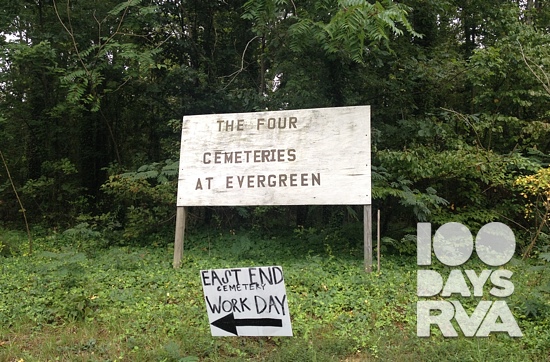Day #061: The Four Cemeteries at Evergreen
The contrast between Civil War cemeteries in Richmond and The Four Cemeteries at Evergreen raises questions about how we tell the story of this city.

Inspired by Michael Bierut’s 100 Day Project, 100 Days to a Better RVA strives to introduce and investigate unique ideas to improving the city of Richmond. View the entire project here and the intro here.
- Idea: Funding and leadership to expedite the reclamation of the Four Cemeteries at Evergreen.
- Difficulty: 2 — Richmond has no shortage of project ideas and no abundance of cash, but it’s tough to imagine public opinion going against this nobel and historical cause.
Richmond’s story is best told through the final resting places and monuments to its most important deceased citizens. Hollywood Cemetery, Monument Avenue, and Oakwood Cemetery tell the stories of people who built, burned, and rebuilt Richmond, but the telling of that story is incomplete.
Oakwood Cemetery may feel like the eastern boundary of the city, but just a little further, at the bottom of the hill straddling the border between Richmond and Henrico, the Four Cemeteries at Evergreen lies hidden down a gravel road. In many ways, the neighboring cemeteries tell a tale of two cities. Perched on a hill with carefully groomed lawns, Oakwood Cemetery honors 17,000 white soldiers who fought to deny opportunities to their now eternal and accomplished neighbors at the bottom of the hill.
Wedged in a forgotten forest between I-64 and East Richmond Road, the Four Cemeteries at Evergreen houses some of the most famous black Richmonders of the 19th and 20th centuries. Evergreen, the largest and most significant of the four, is the final resting place of Maggie L. Walker, Rosa L. Dixon Bowser, John Mitchell Jr., and thousands of other black pioneers who literally helped build this city.
Unfortunately, when purchasing plots, families didn’t pay for a perpetual care fund, and the cemeteries have been severely neglected. Abandoned by owners who are likely now deceased, the 16-acre East End Cemetery has been reclaimed by forest. For over five years, John Shuck has been leading volunteers every week to clear fallen trees, remove English ivy, and uncover head stones.1 So far they have unearthed 500 of the roughly 5,000 graves.
Fortunately, the Four Cemeteries at Evergreen offers Richmond an opportunity to turn this into a tale of one city. The Virginia General Assembly gave $30,000 to Oakwood Cemetery in 1930 for perpetual care.2 Leaders should approach the state about a $433,0003 appropriation for city wide cemetery reclamation.
The city government is somewhat limited because the property is private. Funds could go towards equipment for the already healthy number of volunteers, historical research, and reclaiming other cemeteries. Shuck suggested creating an adopt-a-plot system. The city or state should think about purchasing the properties in the long run because of their historical significance. Most importantly, the government needs to draw attention to this project.
What obligation does Richmond have to its deceased residents? What is an acceptable way to care for the final resting places of the deceased? It’s easy to justify the neglect with the failure to provide for perpetual care, but there has to be a statute of limitations on history–especially considering some of these individuals were born into slavery.
The Four Cemeteries at Evergreen may be hidden in the woods down a gravel path, but to anyone who has visited, they are a constant reminder of the stark contrast between our obsession with white people from the years 1861-1865 and our neglect of the history of other equally important players in the story of Richmond. Reclaiming The Four Cemeteries at Evergreen is a necessary and worthy cause that deserves attention from residents, the city, and the state.
Love this idea? Think it’s terrible? Have one that’s ten times better? Head over to the 100 Days to a Better RVA Facebook page and join in the conversation.
- I highly recommend everyone volunteers at least once. John Shuck is very welcoming, and the work is incredibly worthwhile. ↩
- The act required the governor to annually visit the cemetery. I’m guessing that clause has been long neglected. ↩
- $433,000 is approximately $30,000 adjusted for inflation using the CPI-U. ↩
-
Recommend this
on Facebook -

Report an error
-

Subscribe to our
Weekly Digest





There are 6 reader comments. Read them.